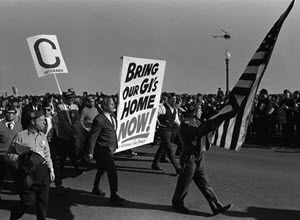 Richard Nixon died 30 years ago this week. I have a complicated and ever-evolving feeling about the 37th President.
Richard Nixon died 30 years ago this week. I have a complicated and ever-evolving feeling about the 37th President.
When he ran for President in 1960 against his frenemy John Kennedy, I heard a story about him possibly having to give up his dog, Checkers. The event took place in 1952, before I was born, but it didn’t seem fair. Of course, the Checkers speech was more nuanced than that.
Even as a kid, I felt a little sorry for the guy. The rule of thumb was that people listening to the debate between the candidates thought Nixon won, but because Nixon was sweaty and nervous, he lost the television audience. Then, when he ran for governor of California and lost in 1962, and famously said, “You won’t have Nixon to kick around anymore,” I felt even more bad for him.
Subsequently, however, I learned about his Red-baiting of Congressman Jerry Voorhis in Nixon’s first campaign in 1946 and Helen Gahagan Douglas, his 1950 Democratic opponent for Senate. So, I became a rabid anti-Nixon person.
Like a bad penny
By the time Nixon ran for President in 1968, I had ascertained that he was a really scary guy. When my father suggested that he might vote for Dick Gregory for President, I lobbied hard in favor of Hubert Humphrey, suggesting that Nixon was too dangerous.
Of course, Nixon won in a three-way race with George Wallace and HHH. In the next several years, many of the Vietnam War protests I attended – and there were a lot – were directed at him personally. “Nixon, Agnew, you can’t hide. We charge you with genocide!” (It was only much later that I learned how Nixon sabotaged peace talks to get elected.)
Still, I didn’t hate EVERYTHING he did as President. Despite his private ambivalence, Nixon embraced Earth Day. “He also created the Environmental Protection Agency and signed the Clean Water Act. In 1973, he signed the Endangered Species Act, or ESA, legislation that he had requested from Congress and was the major champion of. ‘Nothing is more precious and worthy of preservation than the rich array of animal life with which our country has been blessed,’ he said, announcing the bill.”
It was an article of faith that only an avowed anti-communist such as Nixon could go to China. Still, the mining of Haiphong Harbor off North Vietnam, which seemed like an escalation of the war, an event that led to my arrest, made me no fan.
Over before it began
On November 7, 1972, around 7:30 p.m. ET, I was going from Kingston to New Paltz and had not voted yet when the election for Nixon was called. My friend and I were devastated.
Then the Watergate investigation expanded. I was glued to the television when I was not in class. He went away in August 1974, and I was happy. Again, it was later when I discovered that Nixon and Senator Edward Kennedy might have hammered out a more robust healthcare program than Obamacare, but for a miscalculation on Ted’s part.
Nixon was gone. Then he was back, interviewed by David Frost in 1977. Nixon infamously stated that when the president does it, “that means it’s not illegal.” This irritated me greatly then, and more now, since it is the model upon which djt’s defense in 2024 is largely based.
Nixon tried to rehabilitate his image by positioning himself as an elder statesman, writing books, and opining on various issues. I so wanted him to just go away.
RIP
I remember how I first learned that he was sick. Ed Dague, the dean of local television news in the Albany, NY market, had come to my church in the fall of 1993. For some reason, he invited me to see a broadcast in person sometime. By the time I said yes, I’m sure he had forgotten the offer he made to me.
On April 18, 1994, I was in Dague’s office at WNYT-TV. Dague’s co-anchor, Chris Kapostasy (later Jansing), was off that night. At about 9 p.m., someone informs Dague that Nixon is very sick. “Is he dead?” Dague vaguely barks. At the time, I was uncertain whether he was trying to ascertain where the story should fit in the broadcast or expressing his disdain for the man. I suspect it was probably both.
It did not lead the news that night. But four days later, RMN was dead.
Some songs mentioning Richard Milhous Nixon:
The ’68 Nixon (This Year’s Model) – Denver, Boise & Johnson (yes, that’s John Denver)

 Wading through the diary, my friends, the Okie, and I were involved in various activities fighting against the war in Vietnam. Some of the references are oblique, I acknowledge.
Wading through the diary, my friends, the Okie, and I were involved in various activities fighting against the war in Vietnam. Some of the references are oblique, I acknowledge. If “Attica” is just a line you recognize from the movie
If “Attica” is just a line you recognize from the movie 


